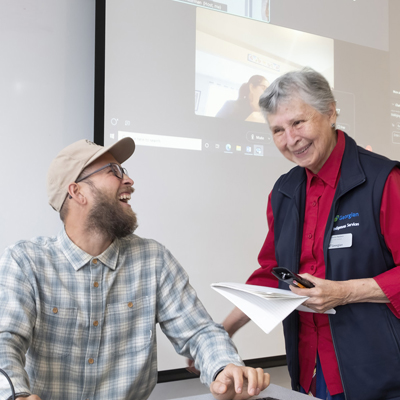
Instructional Coaching
Instructional coaching is a collaborative, supportive, non-evaluative partnership between experienced educators (CTL coaches) and faculty with the primary goal to enhance teaching practices, thereby improving student learning outcomes and fostering a culture of continuous professional development among teachers.
Key components
Collaborative Partnership
- Instructional coaching is built on a foundation of trust and mutual respect. Coaches work alongside faculty members, not as evaluators, but as partners focused on shared goals.
- The relationship is non-evaluative, emphasizing support and growth rather than judgement.
Personalized Professional Development
- Each coaching relationship is tailored to the individual needs and goals of the faculty member.
- Coaches help faculty identify specific areas for improvement and develop actionable strategies to address them.
Evidence-Based Practices
- Coaches utilize evidence-based instructional strategies and methods to guide their support.
- The focus is on implementing proven techniques that enhance teaching effectiveness and student engagement.
Classroom Observations and Feedback
- Coaches may observe classroom sessions, either in-person or through video recordings, to gather insights on teaching practices in a non-evaluative manner.
- Constructive, specific feedback is provided to help faculty refine their techniques and strategies.
Goal setting and Action Planning
- Together, coaches and faculty members set clear, achievable goals for improving instruction.
- Action plans are developed to guide the implementation of new strategies and practices.
Ongoing Support and Reflection
- Coaching is a formalized iterative process involving regular check-ins, reflections, and adjustments.
- Continuous support helps faculty members stay motivated and on track toward achieving their goals.
Benefits of an Instructional Coaching program
- Sustaining and Enhancing Quality Education:
- It is important to attract and retain quality teachers and invest in and focus on quality education. Instructional coaching helps ensure that this investment translates into tangible improvements in teaching and learning.
- Coaches work with faculty to integrate innovative, research-based instructional methods that can enhance the overall quality of education.
- Building a Culture of Continuous Improvement:
- An instructional coaching program offers the resources and stability needed to foster a culture of continuous improvement. Instructional coaching creates spaces for reflection and growth, allowing educators to refine their practices and stay current with educational advancements (Kaufman, 2022).
- By promoting a mindset of ongoing professional development, coaching helps institutions stay ahead in a competitive educational landscape.
- Maximizing Resources:
- Working with all relevant ±ØÓ®¹ÙÍø departments, instructional coaches can help faculty members utilize available teaching and learning resources more efficiently, ensuring that investments in technology, curriculum development, and other areas yield maximum benefits.
- Fostering Innovation and Creativity:
- Instructional coaches can promote innovation and experimentation with new teaching strategies and technologies. In a supportive manner, instructional coaches encourage faculty to explore and implement innovative approaches in their classrooms, fostering a climate of creativity and forward-thinking.
- Coaches support the integration of progressive educational technologies and methodologies, ensuring that the institution remains at the forefront of educational innovation.
- Supporting Faculty Well-Being and Retention:
- Instructional coaching contributes to faculty well-being by providing personalized support and professional growth opportunities which can decrease feelings of isolation and increase a sense of belonging.
- By building strong, supportive relationships with faculty, coaches help create a positive and collaborative work environment (Kaufman, 2022).
- Enhancing Student Outcomes:
- The goal of instructional coaching is to improve student outcomes and an unrivaled student experience.
- Improved teaching practices resulting from coaching lead to better student engagement, higher academic achievement, and increased satisfaction, aligning with ±ØÓ®¹ÙÍø’s strategic plan specifically around and .

What to learn more?
How to participate?
Watch for more information in Fall 2024
Looking for more information? Contact: